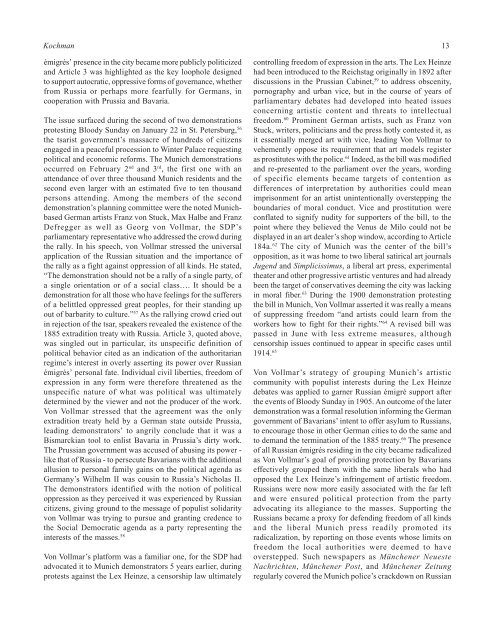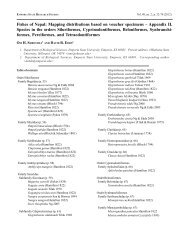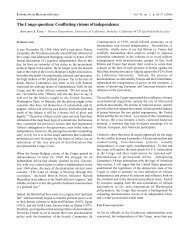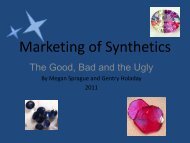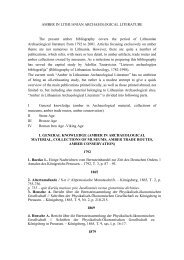Russian émigré artists and political opposition in fin-de-siècle Munich
Russian émigré artists and political opposition in fin-de-siècle Munich
Russian émigré artists and political opposition in fin-de-siècle Munich
- No tags were found...
You also want an ePaper? Increase the reach of your titles
YUMPU automatically turns print PDFs into web optimized ePapers that Google loves.
Kochman 13<strong>émigré</strong>s’ presence <strong>in</strong> the city became more publicly politicized<strong>and</strong> Article 3 was highlighted as the key loophole <strong>de</strong>signedto support autocratic, oppressive forms of governance, whetherfrom Russia or perhaps more fearfully for Germans, <strong>in</strong>cooperation with Prussia <strong>and</strong> Bavaria.The issue surfaced dur<strong>in</strong>g the second of two <strong>de</strong>monstrationsprotest<strong>in</strong>g Bloody Sunday on January 22 <strong>in</strong> St. Petersburg, 56the tsarist government’s massacre of hundreds of citizensengaged <strong>in</strong> a peaceful procession to W<strong>in</strong>ter Palace request<strong>in</strong>g<strong>political</strong> <strong>and</strong> economic reforms. The <strong>Munich</strong> <strong>de</strong>monstrationsoccurred on February 2 nd <strong>and</strong> 3 rd , the first one with anattendance of over three thous<strong>and</strong> <strong>Munich</strong> resi<strong>de</strong>nts <strong>and</strong> thesecond even larger with an estimated five to ten thous<strong>and</strong>persons attend<strong>in</strong>g. Among the members of the second<strong>de</strong>monstration’s plann<strong>in</strong>g committee were the noted <strong>Munich</strong>basedGerman <strong>artists</strong> Franz von Stuck, Max Halbe <strong>and</strong> FranzDefregger as well as Georg von Vollmar, the SDP’sparliamentary representative who addressed the crowd dur<strong>in</strong>gthe rally. In his speech, von Vollmar stressed the universalapplication of the <strong>Russian</strong> situation <strong>and</strong> the importance ofthe rally as a fight aga<strong>in</strong>st oppression of all k<strong>in</strong>ds. He stated,“The <strong>de</strong>monstration should not be a rally of a s<strong>in</strong>gle party, ofa s<strong>in</strong>gle orientation or of a social class…. It should be a<strong>de</strong>monstration for all those who have feel<strong>in</strong>gs for the sufferersof a belittled oppressed great peoples, for their st<strong>and</strong><strong>in</strong>g upout of barbarity to culture.” 57 As the rally<strong>in</strong>g crowd cried out<strong>in</strong> rejection of the tsar, speakers revealed the existence of the1885 extradition treaty with Russia. Article 3, quoted above,was s<strong>in</strong>gled out <strong>in</strong> particular, its unspecific <strong>de</strong>f<strong>in</strong>ition of<strong>political</strong> behavior cited as an <strong>in</strong>dication of the authoritarianregime’s <strong>in</strong>terest <strong>in</strong> overly assert<strong>in</strong>g its power over <strong>Russian</strong><strong>émigré</strong>s’ personal fate. Individual civil liberties, freedom ofexpression <strong>in</strong> any form were therefore threatened as theunspecific nature of what was <strong>political</strong> was ultimately<strong>de</strong>term<strong>in</strong>ed by the viewer <strong>and</strong> not the producer of the work.Von Vollmar stressed that the agreement was the onlyextradition treaty held by a German state outsi<strong>de</strong> Prussia,lead<strong>in</strong>g <strong>de</strong>monstrators’ to angrily conclu<strong>de</strong> that it was aBismarckian tool to enlist Bavaria <strong>in</strong> Prussia’s dirty work.The Prussian government was accused of abus<strong>in</strong>g its power -like that of Russia - to persecute Bavarians with the additionalallusion to personal family ga<strong>in</strong>s on the <strong>political</strong> agenda asGermany’s Wilhelm II was cous<strong>in</strong> to Russia’s Nicholas II.The <strong>de</strong>monstrators i<strong>de</strong>ntified with the notion of <strong>political</strong>oppression as they perceived it was experienced by <strong>Russian</strong>citizens, giv<strong>in</strong>g ground to the message of populist solidarityvon Vollmar was try<strong>in</strong>g to pursue <strong>and</strong> grant<strong>in</strong>g cre<strong>de</strong>nce tothe Social Democratic agenda as a party represent<strong>in</strong>g the<strong>in</strong>terests of the masses. 58Von Vollmar’s platform was a familiar one, for the SDP hadadvocated it to <strong>Munich</strong> <strong>de</strong>monstrators 5 years earlier, dur<strong>in</strong>gprotests aga<strong>in</strong>st the Lex He<strong>in</strong>ze, a censorship law ultimatelycontroll<strong>in</strong>g freedom of expression <strong>in</strong> the arts. The Lex He<strong>in</strong>zehad been <strong>in</strong>troduced to the Reichstag orig<strong>in</strong>ally <strong>in</strong> 1892 afterdiscussions <strong>in</strong> the Prussian Cab<strong>in</strong>et, 59 to address obscenity,pornography <strong>and</strong> urban vice, but <strong>in</strong> the course of years ofparliamentary <strong>de</strong>bates had <strong>de</strong>veloped <strong>in</strong>to heated issuesconcern<strong>in</strong>g artistic content <strong>and</strong> threats to <strong>in</strong>tellectualfreedom. 60 Prom<strong>in</strong>ent German <strong>artists</strong>, such as Franz vonStuck, writers, politicians <strong>and</strong> the press hotly contested it, asit essentially merged art with vice, lead<strong>in</strong>g Von Vollmar tovehemently oppose its requirement that art mo<strong>de</strong>ls registeras prostitutes with the police. 61 In<strong>de</strong>ed, as the bill was modified<strong>and</strong> re-presented to the parliament over the years, word<strong>in</strong>gof specific elements became targets of contention asdifferences of <strong>in</strong>terpretation by authorities could meanimprisonment for an artist un<strong>in</strong>tentionally overstepp<strong>in</strong>g theboundaries of moral conduct. Vice <strong>and</strong> prostitution wereconflated to signify nudity for supporters of the bill, to thepo<strong>in</strong>t where they believed the Venus <strong>de</strong> Milo could not bedisplayed <strong>in</strong> an art <strong>de</strong>aler’s shop w<strong>in</strong>dow, accord<strong>in</strong>g to Article184a. 62 The city of <strong>Munich</strong> was the center of the bill’s<strong>opposition</strong>, as it was home to two liberal satirical art journalsJugend <strong>and</strong> Simplicissimus, a liberal art press, experimentaltheater <strong>and</strong> other progressive artistic ventures <strong>and</strong> had alreadybeen the target of conservatives <strong>de</strong>em<strong>in</strong>g the city was lack<strong>in</strong>g<strong>in</strong> moral fiber. 63 Dur<strong>in</strong>g the 1900 <strong>de</strong>monstration protest<strong>in</strong>gthe bill <strong>in</strong> <strong>Munich</strong>, Von Vollmar asserted it was really a meansof suppress<strong>in</strong>g freedom “<strong>and</strong> <strong>artists</strong> could learn from theworkers how to fight for their rights.” 64 A revised bill waspassed <strong>in</strong> June with less extreme measures, althoughcensorship issues cont<strong>in</strong>ued to appear <strong>in</strong> specific cases until1914. 65Von Vollmar’s strategy of group<strong>in</strong>g <strong>Munich</strong>’s artisticcommunity with populist <strong>in</strong>terests dur<strong>in</strong>g the Lex He<strong>in</strong>ze<strong>de</strong>bates was applied to garner <strong>Russian</strong> <strong>émigré</strong> support afterthe events of Bloody Sunday <strong>in</strong> 1905. An outcome of the later<strong>de</strong>monstration was a formal resolution <strong>in</strong>form<strong>in</strong>g the Germangovernment of Bavarians’ <strong>in</strong>tent to offer asylum to <strong>Russian</strong>s,to encourage those <strong>in</strong> other German cities to do the same <strong>and</strong>to <strong>de</strong>m<strong>and</strong> the term<strong>in</strong>ation of the 1885 treaty. 66 The presenceof all <strong>Russian</strong> <strong>émigré</strong>s resid<strong>in</strong>g <strong>in</strong> the city became radicalizedas Von Vollmar’s goal of provid<strong>in</strong>g protection by Bavarianseffectively grouped them with the same liberals who hadopposed the Lex He<strong>in</strong>ze’s <strong>in</strong>fr<strong>in</strong>gement of artistic freedom.<strong>Russian</strong>s were now more easily associated with the far left<strong>and</strong> were ensured <strong>political</strong> protection from the partyadvocat<strong>in</strong>g its allegiance to the masses. Support<strong>in</strong>g the<strong>Russian</strong>s became a proxy for <strong>de</strong>fend<strong>in</strong>g freedom of all k<strong>in</strong>ds<strong>and</strong> the liberal <strong>Munich</strong> press readily promoted itsradicalization, by report<strong>in</strong>g on those events whose limits onfreedom the local authorities were <strong>de</strong>emed to haveoverstepped. Such newspapers as Münchener NeuesteNachrichten, Münchener Post, <strong>and</strong> Münchener Zeitungregularly covered the <strong>Munich</strong> police’s crackdown on <strong>Russian</strong>


